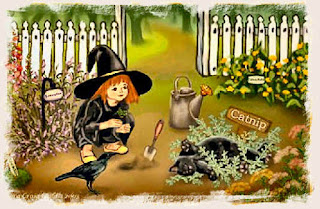"That's Kali," I respond. "She my favorite goddess."

"She looks scary."
"That's because she protects us from bad things. That's why she's a bit scary."
That was how I introduced my son to Kali, many years ago. He spent over a year entranced with the magnet showing Kali in all her deadly glory. When we moved, he insisted that we bring her along with us. Because she protects us.
Kids want to know about our gods and goddesses. They crave the security of having someone else looking out for them. They want to know that someone is looking out for mom and dad like mom and dad look out for them.
Here are some things to keep in mind when introducing the gods:
1. Keep pictures and statues in sight and let the kids become curious about the images on their own. And they will. Kids are curious about everything.
2. Don't be afraid to filter out some of the more complicated stuff - you can get to that later, when the child is older and better able to grasp those nuances.
3. Keep the language age-appropriate. Just because a $5 word is commonly used doesn't mean that is the best way to describe the god or goddess to your child.
 4. Introducing the gods to our children doesn't have to be a full education. Our minds develop in such a way that we learn very well with small bits of information, stories and pictures. Tell a basic story or simple explanation of the god or goddess. Then, let the child have time to consider that. More questions will come.
4. Introducing the gods to our children doesn't have to be a full education. Our minds develop in such a way that we learn very well with small bits of information, stories and pictures. Tell a basic story or simple explanation of the god or goddess. Then, let the child have time to consider that. More questions will come.
5. Involve the kids in basic rituals once they've been introduced. Our kids were intrigued about the candy we left out for Ganesha. Soon they were excited to help give the offerings (and later steal them - good thing Ganesha likes kids).
6. Don't just limit the information to a textbook-type of description. Make sure that you explain why you like the god or goddess, and how they influence or help you. Show them the ways we interact with our gods and why we do it.
7. When they are older, help your kids decide when and how to honor gods and goddesses for their own lives. Perhaps Thoth can help them study, or Apollo will inspire their choice of band instrument. Don't be afraid to make suggestions, but don't push them. Most kids will find the idea intriguing without any pressure.
 |
| Toddler Altar by MazerCreations |
8. Eventually, the child will ask about a god or goddess that isn't one of your bent. It may even be Jesus or Jehovah. It is important to remain objective about them. If you aren't critical about any other gods, they will notice if you are critical about that one. Explain who the god or goddess is, why some people choose to worship them, and why you choose not to. It's okay to go into social and historical contexts, as long as it's age-appropriate.
9. Have fun! Gods and goddesses are for celebrating. Let your child feel your own emotional connection to the gods, and let them get excited to share that.
10. Don't worry about brainwashing. It's a lot harder to brainwash people than you think. For children, this is a comfort and a family bond. If you don't think they will ever be able to choose for themselves... well, wait 'til they're teens.



